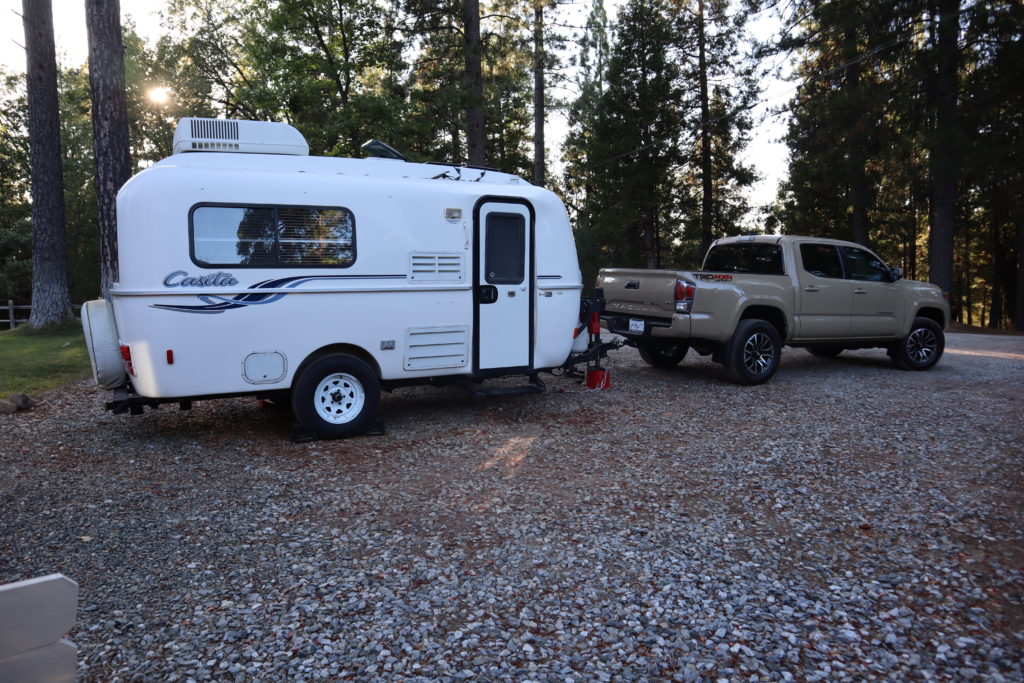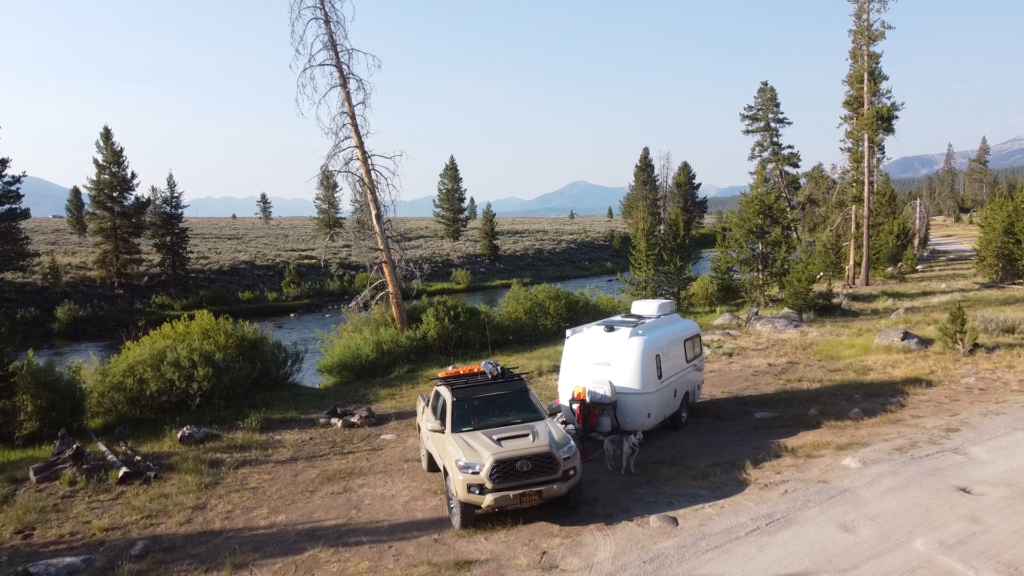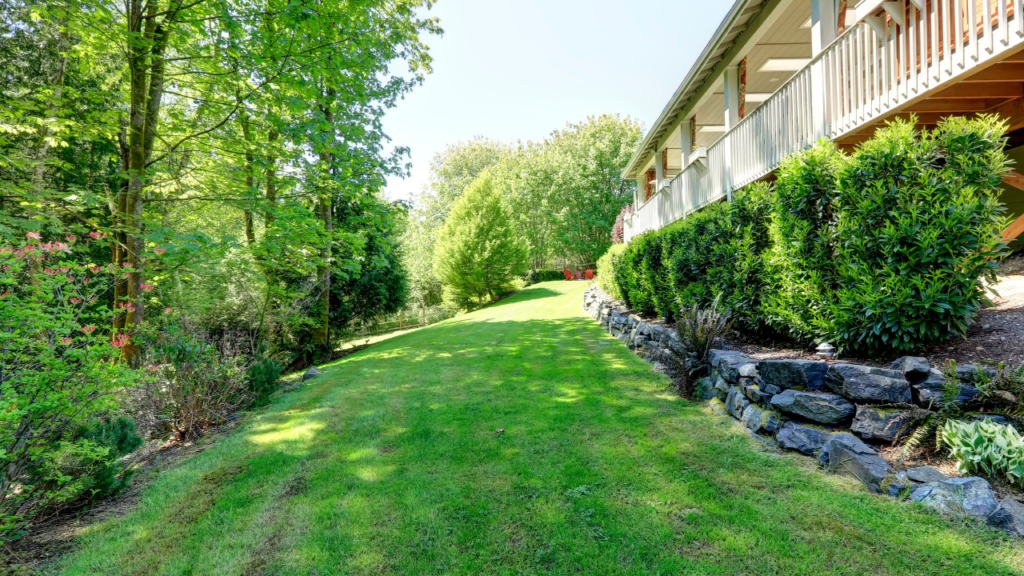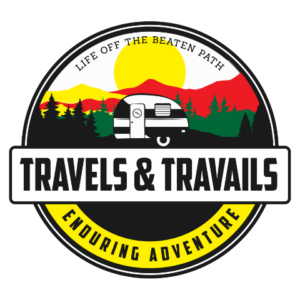
Travel trailers are the most popular RV in the US. According to rvia.org, 279,470 travel trailers were shipped in the US in 2021, making up about 56% of all RVs sold that year.
There are several reasons to choose a small travel trailer:
- Lower Cost
- More Versatile
- More Functional
- Easier to Store
- Easier to Tow
1. Cost
Travel trailers are a bargain when compared to other RVs like class A, class B, and class C campers. The cost to purchase a brand new small travel trailer is as low as $14,000! In contrast, the entry-level cost of a new class A is $100,000. Even a class C is cost prohibitive when the lowest price for a new one is $73,000.
Small trailers are less expensive than larger trailers in their class; not by square footage, but by dollars. You’ll pay less for a smaller trailer.
What is the Cost for a New RV in 2022?
Class A: $100,000 – $1,000,000
Class B: $90,000 – $285,000
Class C: $ – $73,000 – $285,000
Fifth Wheel: $33,000 – $264,000
Truck Campers: $15,000 – $108,000
Travel Trailer: $14,000 – $205,000
Tent Trailer: $9,800 – $60,000
Other Costs
In addition to the initial cost of the RV, there are other costs associated with owning an RV. If you purchase a small travel trailer, the costs for gasoline, insurance, and maintenance will be less than owning another class of RV. And, with gas prices rising, having a smaller travel trailer and tow vehicle is a definite advantage.
Small tow vehicles can also be used as daily driver, thereby doubling their usefulness. And, when you do have to replace your tow vehicle, you’ll be spending a whole lot less than you would if you replaced your Class A, Class B, or Class C RV.
As your RV ages, you’ll be replacing something, the engine, transmission, etc. and that gets expensive. Alternately, you’ll have to replace your RV for dependability when it has too many miles. Maintenance on a small travel trailer is far less expensive than these costs.
Plus, when you replace your RV, you’ll be leaving all your modifications behind. And, it’s unlikely that you’ll recoup the costs of those modifications when the RV is sold.
2. Versatility
Often, when we camp, we disconnect our tow vehicle and leave it at the campsite. That way, we can park the tow vehicle at attractions. If you’ve ever been to a National Park, you’ll know that most parking spots are designed for cars. Often, there is very limited parking for larger RVs.
Since we own a small travel trailer, we don’t need a large tow vehicle either. While we were in Yellowstone National Park, we watched as many larger RVs and large tow vehicles struggled to find parking. We were able to pull right into a car-sized parking slot with our small tow vehicle.
If you have a Class A or Class C you may need a tow-behind or “towed” vehicle. The advantage of a towed with a Class A or Class C is that you can get into those smaller parking spots with your towed than you couldn’t get into with a Class A or Class B. However, your costs increase substantially because now you have two vehicles to maintain; your RV and your towed. Gasoline, insurance, and maintenance costs also increase over the costs of owning a travel trailer and a tow vehicle.
We like to get off the beaten path. With the campsite filled to the brim with wall-to-wall people and sites selling out immediately, we appreciate having the option of dispersed camping at the Bureau of Land Management and National Forest lands.
With the exception of a Class B or truck camper, most RVs aren’t suitable to be taken on rougher roads. A small travel trailer is agile and many models offer the clearance of a high-lift axle to get you further off the beaten path. Plus, many tow vehicles have four-wheel drive. We have taken our trailer on rough roads and through water crossings. Most Class A and Class C RVs are not designed for travel off paved roads.
While a Class B camper or truck camper can get you off the beaten path, many of these vehicles are quite small. We like the convenience of having a bathroom in our travel trailer, which is something the smaller Class B campers and truck campers often don’t offer.
3. Functionality
All the square footage allotted to us in our travel trailer is space that can be utilized as living space. In other RVs, the living spaces are decreased by the engine, cab, etc.
As I mentioned, campsites are competitive and at a premium. When you have a small travel trailer, you have access to many more campsites than you would with a larger RV. Many state and national parks have size limitations for campsites. In Yosemite National Park, most of the campsites are no longer than 35 feet. All small trailers will fit in a 35-foot campsite while many larger RVs will have to camp elsewhere.
I don’t prefer RV parks so I really appreciate how we can get into national and state park sites with our small travel trailer. Plus, we have an advantage when it comes to dispersed campsites, in places where many larger RVs can’t fit.

Smaller travel trailers are easier to maintain than larger travel trailers or RVs. Just like small houses, small trailers are easier to maintain because they have less square footage and are often less complex than larger trailers, and certainly less complex than motorized RVs.
Engines and transmissions require routine maintenance and this maintenance takes time and effort. If you’re using your tow vehicle as a daily driver, you’ll have to maintain it anyway.
If you enjoy a minimalist lifestyle, you’ll love a small trailer. It’s faster to clean, easier to pack and unpack, and you won’t be hauling around things that you won’t use.
4. Storage
Storage costs are rising. And, storage facilities are not as secure as you would imagine. And, when your RV is in storage, you run the risk of it being damaged, either while maneuvering it in a crowded, unfamiliar space, or having another RV owner accidentally damage it while maneuvering their own RV.
Small travel trailers can often be parked in a small side yard behind a locked gate. Many small pop-up travel trailers fit in a garage. Having your trailer parked at home is so much more convenient than having to go pick up your RV, load it, and then clean it and take it back to the RV storage when you’re done.
If you do have to store your small travel trailer in a storage yard, you’ll have more options for storage since it’s small.

5. Towing
While learning to tow a trailer is a skill, towing a small travel trailer is easier than towing a large travel trailer or trying to maneuver a large RV. Plus, backing a small travel trailer into a campsite is easier than backing a large RV. I read about a woman who purchased a new 28-foot travel trailer. She was concerned that she might have difficulty getting it in and out of gas stations and maneuvering it around the campground. These are very legitimate concerns. With our small travel trailer, we pull right into the gas station and don’t have any problems backing into campsites or maneuvering around the campground. And, we don’t even need mirror extensions to see around it.
Conclusion
In this time of ever-increasing inflation, smaller is better! Get a small travel trailer and find out adventures are in store for you. Happy Trails!
